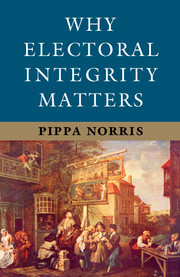Book contents
- Frontmatter
- Contents
- List of Figures
- List of Tables
- Preface and Acknowledgments
- Part I Introduction
- 1 Theories Why Electoral Integrity Matters
- 2 The Concept of Electoral Integrity
- 3 Evidence
- Part II The Problem of Flawed Elections
- Part III The Consequences of Electoral Integrity
- Part IV Conclusions
- Technical Appendix A: Description of Variables and Scale Construction
- Technical Appendix B: Questions in the Expert Survey of Perceptions of Electoral Integrity
- Technical Appendix C: Electoral Context and Background in the Selected Cases
- Notes
- Select Bibliography
- Index
3 - Evidence
Published online by Cambridge University Press: 05 July 2014
- Frontmatter
- Contents
- List of Figures
- List of Tables
- Preface and Acknowledgments
- Part I Introduction
- 1 Theories Why Electoral Integrity Matters
- 2 The Concept of Electoral Integrity
- 3 Evidence
- Part II The Problem of Flawed Elections
- Part III The Consequences of Electoral Integrity
- Part IV Conclusions
- Technical Appendix A: Description of Variables and Scale Construction
- Technical Appendix B: Questions in the Expert Survey of Perceptions of Electoral Integrity
- Technical Appendix C: Electoral Context and Background in the Selected Cases
- Notes
- Select Bibliography
- Index
Summary
The research design used in this book builds on the conceptualization and the theoretical framework discussed in previous chapters and describes several primary sources of evidence. As mentioned in the introduction, attempts to measure electoral integrity quickly encounter major challenges, similar to those facing attempts to monitor equally complex but hidden phenomenon, such as corruption. Many contests end with cries of fraud by losing parties or candidates. These may reflect genuine violations of electoral rights – or merely sour-grape attempts to stoke malcontent, deter leadership challenges by excusing a bad electoral performance, and/or undermine the rightful winners. Acts of electoral fraud involve clandestine attempts to fiddle with the ballots, which are inherently difficult to detect. Legal records can be scrutinized, such as prosecutions for violations of electoral law, voter registration fraud, or disqualified candidates struck off the ballot. But these cases may only skim the surface of the problem, particularly where petty bribery is accepted as a routine part of the culture, the state itself is the main perpetrator of malpractices or, indeed, violations of international standards are legally condoned. The courts, police, and electoral authorities may also be in the pocket of the ruling party. Media reports also evaluate the quality of an election. But do these sources provide reliable evidence? Journalists may be biased by partisan leanings and by headlines focused on negative news about election disputes and political scandals. Some of the most repressive regimes muzzle critical coverage. Statistical techniques of electoral forensics are designed to detect voting irregularities, but as yet there is no consensus about the most appropriate and reliable statistical indicators. Even if determined, these techniques are confined to detecting problems occurring at the ballot box and count, rather than throughout the electoral cycle. In-depth case studies and well-designed and rigorous, randomized field and natural experiments provide important insights, but the results remain highly contextual, suffering from limited generalizability. The impact on fraud arising from the deployment of electoral observers to a randomized selection of polling stations in say, Armenia, may differ from the effects in, say, Afghanistan.
- Type
- Chapter
- Information
- Why Electoral Integrity Matters , pp. 40 - 72Publisher: Cambridge University PressPrint publication year: 2014



